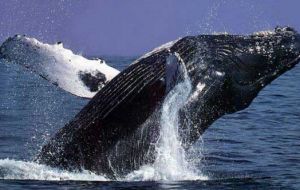MercoPress. South Atlantic News Agency
Chilean Conservation Groups Reject Whaling Commission Latest Proposals
 Let them enjoy their freedom
Let them enjoy their freedom A new proposal announced last week by the International Whaling Commission (IWC) would allow the killing of a number of whales in the Antarctic Ocean off the coast of Chile and has Chilean environmental groups upset.
For 25 years, the International Whaling Commission (IWC) has held a moratorium on commercial hunting of whales. Now, the organization is considering a change in policy. Since 1986, the IWC has maintained a freeze on commercial whaling. Iceland and Norway have legal objections to the moratorium and Japan continues to hunt whales, using a loophole that allows the killing of whales for “scientific purposes”.
In order to control the continued hunting, the IWC’s chairman, Chilean Cristian Maquieira, has proposed giving these countries official catch quotas for the next 10 years. The proposal provides increased efforts to ensure the recovery of whale populations, including improvements in governance and compliance, and actions for endangered whale conservation.
Environmentalists are sceptical of the measures, yet the IWC maintains that the new rules will increase cooperation and conservation efforts in the future.
“This proposal represents a historic step, a paradigm shift in how the Commission would operate,” said IWC Vice-Chair Anthony Liverpool. “Rather than the mistrust and confrontation that have led to little progress, we now have the opportunity to reconcile our differences and so strengthen actions related to our shared goal of maintaining healthy whale populations and recovering depleted stocks. This consensus decision would represent a delicate balance of accommodations by all IWC members and establish a 10-year period of stability during which we can work to resolve our major long-term issues.”
“We could put the focus where it belongs—on improving the conservation of whales and the management of whaling,” he said. In addition, Liverpool said, because of the agreement, several thousand fewer whales will be killed and no other IWC countries will be allowed to start hunting during the 10-year period of this proposal. “For the first time since the adoption of the commercial whaling moratorium, we will have strict, enforceable limits on all whaling operations.”
Yet some environmental groups, including WWF International, disagree.
“The proposed charges were not created using IWC scientific methods, but are the result of political negotiations that have little or nothing to do with the whales themselves,” said Wendy Elliott, in charge of the Species Program of WWF International. Mauricio Galvez, the Program Coordinator of Marine Conservation of WWF Chile, told the Santiago Times that the proposal is “absolutely unacceptable.”
He agrees with Elliot that the lack of a scientific base is one reason this proposal is not adequate. “For the WWF and the millions of like-minded citizens it represents, the IWC’s proposal is morally unacceptable, it violates the Southern Whale Sanctuary, it does not take into account the scientific information and allows the killing of endangered whales.”
The Antarctic Ocean is the primary feeding ground for several species of whales, such as the blue whale, the humpback and fin whales. “Some whales feed exclusively on this ocean, eating no food during the winter months when they travel to tropical seas,” Elliott said.
Both the fin whale and sei whales, found in the Antarctic Ocean, are endangered species. This proposal would allow some countries to hunt 65 fin whales in the Antarctic Ocean and 500 sei whales in the North Pacific over a period of 10 years.
Recently, in the North Pacific, sei whales numbers were reduced from 42,000 to 8,600. After 725,000 fin whales were slaughtered in the twentieth century, recent estimates put numbers of fin whales around 15,150 in the southern hemisphere.
Whale protection efforts in Chile were thought to have increased recently. In June 2008, then-President Michelle Bachelet announced a whale protection zone on the Pacific coast. “That means that Chile is committed to the whales and will do as much as we can, in Chile, and in the world to support the fight for the conservation of the whales and against its extinction,” she said. However, at the beginning of this year, Bachelet remained silent when Japanese whalers were accused of killing whales off the coast of Chile.
The IWC’s proposal will not affect the Chilean Whale Sanctuary, said Galvez. Still, the sanctuary may not host as many whales in the future due to the new proposal which could affect the migratory patterns of the whales. Additionally, support of the IWC proposal would demonstrate a reverse in its political posture.
“Chile has set up a whale sanctuary in an exclusive economic zone, is developing initiatives to conserve whales and other species in the Gulf of Corcovado, whose iconic animal is the blue whale, and has provided protection to the populations of humpback and minke through the Francisco Coloane Marine Protected Area in Magallanes. Government support for this initiative of the IWC would represent a serious weakening of all these initiatives.”
Juan Carlos Cardenas, veterinarian director of the Ecocean Center, a Chilean organization focused on environmental and oceanic issues, has similar issues with the flip-flop of the Chile’s government.
“It is totally inconsistent that the same rule of Chile in 2008 in response to the high pressure from citizens, indefinitely banned all commercial whaling activity and ‘scientific’ whales in its waters, is driving today the reopening of commercial whaling and legitimizing global operations ‘scientific’ whaling by the Japanese whaling fleet in Antarctic waters. Where is the pilot in charge of Chile’s international policy?” he asked.
The next meeting of the 88-member International Whaling Commission is June 21-25 in Agadair, Morocco, when the proposal could be accepted or changed. The WWF is creating an alternative proposal to present at that time.
By Laura French – Santiago Times




Top Comments
Disclaimer & comment rulesCommenting for this story is now closed.
If you have a Facebook account, become a fan and comment on our Facebook Page!